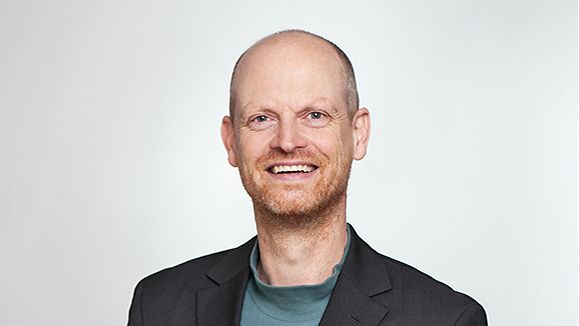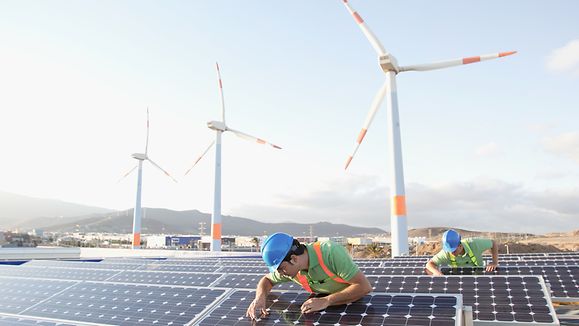Energy
Green Energy News | August 2024
Germany’s green energy sector is setting the wheels in motion in order to realize the country’s ambitious plans to become climate neutral by 2045.
Aug 19, 2024
- Germany speeds up approval procedures for onshore wind energy and solar energy
- Germany’s hydrogen “core network” plans gather momentum
- Plug-in solar boom on Germany’s balconies
- World’s first plant for industrial solar fuel production inaugurated in Jülich
- New solar module produces energy and heat
- Rural areas enjoy renewable energy location advantage
Germany speeds up approval procedures for onshore wind energy and solar energy
Germany’s federal cabinet has adopted a draft law to implement the EU Renewable Energy Directive for onshore wind energy and solar energy as well as energy storage facilities at the same site. The move, which will see fast-track areas and shortened approval procedures for swifter wind and solar park expansion and energy storage, implements requirements from the 2023 EU directive. A central element of the proposed legislation is the designation of acceleration areas for onshore wind energy plants and solar energy plants, including associated energy storage facilities, regulated in the Building Code and the Spatial Planning Act. This means that projects within these areas can be approved in a simplified and accelerated procedure in accordance with the new provisions of the Wind Energy Area Requirements Act. The EU Renewable Energy Directive is seeking to increase the share of renewable energy sources used in end energy consumption to at least 42.5 percent. In related news, the government cabinet also agreed on changes to facilitate and accelerate the approvals process for electrolyzers used in hydrogen production.
Germany’s hydrogen “core network” plans gather momentum
Gas pipeline operators in Germany have submitted their application for the construction of a planned hydrogen “core network” central to the country’s ambitious hydrogen goals. The hydrogen core network is considered an important building block for the transformation of industry towards climate neutrality. Construction on the proposed network will begin once approved by the Federal Network Agency (BNetzA), with the first lines expected to go into operation as early as next year. The EUR 20 billion plan will see the creation of a 10,000 km pipeline – of which 60 percent are extant natural gas pipelines that will be repurposed. According to plans, the hydrogen core network – that will connect the focal points of hydrogen production, consumption, storage and import – should be completed by 2032. The proposed core network will provide planning security for hydrogen producers, power plant and storage operators and consumers alike. Germany aims to become climate-neutral by 2045 with the help of hydrogen imports.
Plug-in solar boom on Germany’s balconies
More than 500,000 plug-in solar systems have been installed in Germany to date according to the Federal Network Agency, with around 220,000 PV devices installed on balconies in the first half of 2024. Plug-in solar panels accounted for 200 MW of additional photovoltaic (PV) power capacity during the same period. “Balcony” PV kits, which produce around 10 percent of the energy produced by rooftop systems, can be easily bought online and do not require certified installation. Uptake has been accelerated by a simplified registration process introduced in April of this year. More than 90 GW of PV capacity has been installed in the country to date, with capacity set to reach 215 GW by 2030.
World’s first plant for industrial solar fuel production inaugurated in Jülich
Swiss cleantech company Synhelion has inaugurated the world’s first industrial-scale plant for the production of synthetic fuels using solar heat in Jülich, North Rhine-Westphalia. Using a 20-meter-high solar tower and a mirror field, the DAWN facility will produce several thousand liters of synthetic crude oil – for processing into certified fuels in a conventional oil refinery – annually. The solar fuels created, including solar kerosene for aviation, are seen a first step on the road to defossilizing the transportation sector, most notably the aviation sector. The ETH Zurich spin-off plans to start construction of its first commercial plant next year.
New solar module produces energy and heat
Germany’s Sunmaxx PVT and Oxford PV launched a new photovoltaic-thermal module capable of producing electricity and heat at this year’s Intersolar event. The module has a record electrical efficiency of 26.6 percent and a thermal efficiency of 53.4 percent, with electrical output of 433W. The “Solar Hammer” module represents the first use of perovskite-on-silicon tandem solar cells in a photovoltaic-thermal module according to the two companies. With both the cells and the modules set to be manufactured in Germany, Solar Hammer represents a step forward in increasing solar PV technology competitiveness in Europe. The technology will be commercialized within the next 18 months, with Oxford PV supplying the cells from its production facility in Brandenburg an der Havel, while Sunmaxx PVT will produce the Solar Hammer modules at its factory in Ottendorf-Okrilla.
Rural areas enjoy renewable energy location advantage
The widespread availability of renewable power has become an important business location advantage for Germany’s rural areas according to a recent German Economic Institute report. As German industry seeks to move to electrified production processes, the growing use of electricity is allowing regions beyond industrial centers in the south of the country to position themselves as business locations. Recent examples include Northvolt’s proposed major investment in Schleswig-Holstein and Intel’s plans in Saxony-Anhalt. More than 75 percent of domestic installed net capacity of solar and wind energy is rurally situated, making these regions central to Germany’s energy transition.

